
Palm oil is an edible vegetable oil derived from the mesocarp of the fruit of the oil palms. The oil is used in food manufacturing, in beauty products, and as biofuel. Palm oil accounted for about 33% of global oils produced from oil crops in 2014. Palm oils are easier to stabilize and maintain quality of flavor and consistency in processed foods, so are frequently favored by food manufacturers. On average globally, humans consumed 7.7 kg (17 lb) of palm oil per person in 2015. Demand has also increased for other uses, such as cosmetics and biofuels, creating more demand on the supply encouraging the growth of palm oil plantations in tropical countries.

Biofuel is a fuel that is produced over a short time span from biomass, rather than by the very slow natural processes involved in the formation of fossil fuels, such as oil. According to the United States Energy Information Administration (EIA), biofuels are mostly used for transportation, but can also be used for heating and electricity.

Biodiesel is a form of diesel fuel derived from plants or animals and consisting of long-chain fatty acid esters. It is typically made by chemically reacting lipids such as animal fat (tallow), soybean oil, or some other vegetable oil with an alcohol, producing a methyl, ethyl or propyl ester by the process of transesterification.

Vegetable oils, or vegetable fats, are oils extracted from seeds or from other parts of fruits. Like animal fats, vegetable fats are mixtures of triglycerides. Soybean oil, grape seed oil, and cocoa butter are examples of seed oils, or fats from seeds. Olive oil, palm oil, and rice bran oil are examples of fats from other parts of fruits. In common usage, vegetable oil may refer exclusively to vegetable fats which are liquid at room temperature. Vegetable oils are usually edible.
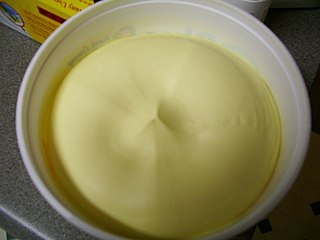
Margarine is a spread used for flavoring, baking, and cooking. It is most often used as a substitute for butter. Although originally made from animal fats, most margarine consumed today is made from vegetable oil. The spread was originally named oleomargarine from Latin for oleum and Greek margarite. The name was later shortened to margarine.
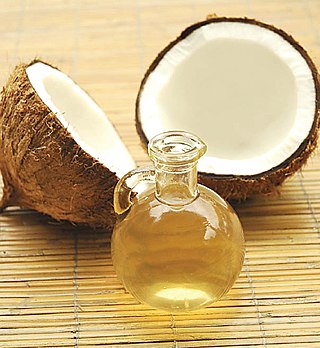
Coconut oil is an edible oil derived from the wick, meat, and milk of the coconut palm fruit. Coconut oil is a white solid fat; in warmer climates during the summer months it is a clear thin liquid oil, melting at warmer room temperatures of around 25 °C (77 °F). Unrefined varieties have a distinct coconut aroma. It is used as a food oil, and in industrial applications for cosmetics and detergent production. Due to its high levels of saturated fat, numerous health authorities recommend limiting its consumption as a food.
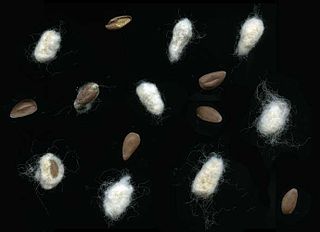
Cottonseed oil is cooking oil from the seeds of cotton plants of various species, mainly Gossypium hirsutum and Gossypium herbaceum, that are grown for cotton fiber, animal feed, and oil.
Hydrogenolysis is a chemical reaction whereby a carbon–carbon or carbon–heteroatom single bond is cleaved or undergoes lysis (breakdown) by hydrogen. The heteroatom may vary, but it usually is oxygen, nitrogen, or sulfur. A related reaction is hydrogenation, where hydrogen is added to the molecule, without cleaving bonds. Usually hydrogenolysis is conducted catalytically using hydrogen gas.
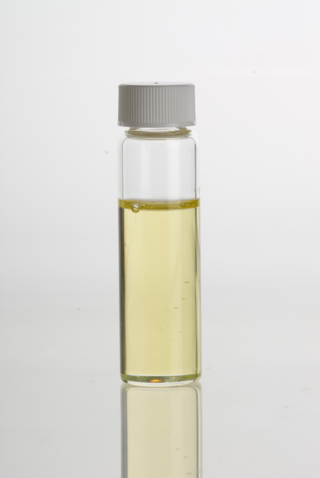
Sesame oil is an edible vegetable oil derived from sesame seeds. The oil is one of the earliest-known crop-based oils. Worldwide mass modern production is limited due to the inefficient manual harvesting process required to extract the oil. Oil made from raw seeds, which may or may not be cold-pressed, is used as a cooking oil. Oil made from toasted seeds is used for its distinctive nutty aroma and taste, although it may be unsuitable for frying, which makes it taste burnt and bitter.
The oil and gas industry is usually divided into three major sectors: upstream, midstream, and downstream. The downstream sector is the refining of petroleum crude oil and the processing and purifying of raw natural gas, as well as the marketing and distribution of products derived from crude oil and natural gas. The downstream sector reaches consumers through products such as gasoline or petrol, kerosene, jet fuel, diesel oil, heating oil, fuel oils, lubricants, waxes, asphalt, natural gas, and liquefied petroleum gas (LPG) as well as naphtha and hundreds of petrochemicals.

Soybean oil is a vegetable oil extracted from the seeds of the soybean. It is one of the most widely consumed cooking oils and the second most consumed vegetable oil. As a drying oil, processed soybean oil is also used as a base for printing inks and oil paints.

Murray Raney was an American mechanical engineer born in Carrollton, Kentucky. He was the developer of a nickel catalyst that became known as Raney nickel, which is often used in industrial processes and scientific research for the hydrogenation of multiple covalent bonds present in molecules.
Renewable Fuels are fuels produced from renewable resources. Examples include: biofuels and Hydrogen fuel. This is in contrast to non-renewable fuels such as natural gas, LPG (propane), petroleum and other fossil fuels and nuclear energy. Renewable fuels can include fuels that are synthesized from renewable energy sources, such as wind and solar. Renewable fuels have gained in popularity due to their sustainability, low contributions to the carbon cycle, and in some cases lower amounts of greenhouse gases. The geo-political ramifications of these fuels are also of interest, particularly to industrialized economies which desire independence from Middle Eastern oil.
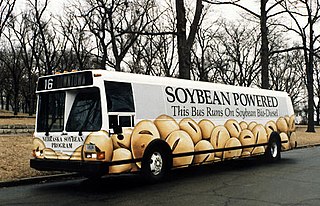
Vegetable oils are increasingly used as a substitute for fossil fuels. Vegetable oils are the basis of biodiesel, which can be used like conventional diesel. Some vegetable oil blends are used in unmodified vehicles, but straight vegetable oil often needs specially prepared vehicles which have a method of heating the oil to reduce its viscosity and surface tension, sometimes specially made injector nozzles, increased injection pressure and stronger glow-plugs, in addition to fuel pre-heating is used. Another alternative is vegetable oil refining.
H-Bio is an oil-refining processes which involves converting vegetable oil into high-quality diesel via hydrogenation. Hydrogenation is a chemical reaction, in which a substance is treated with Hydrogen, thus resulting in a new product. In H-Bio, Hydrogen is added to vegetable oil and mineral oil, making a usable diesel that is made up of diesel oil and 10% vegetable oil. The process was first developed in 2006 by the Brazilian, state-owned and gas company, Petrobras, and was primarily established for commercial use.
Hydrotreated Vegetable Oil (HVO) is a biofuel made by the hydrocracking or hydrogenation of vegetable oil. Hydrocracking breaks big molecules into smaller ones using hydrogen while hydrogenation adds hydrogen to molecules. These methods can be used to create substitutes for gasoline, diesel, propane, kerosene and other chemical feedstock. Diesel fuel produced from these sources is known as green diesel or renewable diesel.

Automotive oil recycling involves the recycling of used oils and the creation of new products from the recycled oils, and includes the recycling of motor oil and hydraulic oil. Oil recycling also benefits the environment: increased opportunities for consumers to recycle oil lessens the likelihood of used oil being dumped on lands and in waterways. For example, one gallon of motor oil dumped into waterways has the potential to pollute one million gallons of water.
Wilmar International Limited is a Singaporean food processing and investment holding company with more than 300 subsidiary companies. Founded in 1991, it is one of Asia's leading agribusiness groups alongside the COFCO Group. It ranks amongst the largest listed companies by market capitalisation on the Singapore Exchange (SGX), being the second largest as of September 2010. It was ranked 211th in the Fortune Global 500 list in 2020. It was ranked 3rd in the World's Most Admired Company by Fortune in 2019.

Apple seed oil is a vegetable oil obtained by pressing apple seeds. It is used in manufacturing cosmetics.
Olive pomace oil is olive oil that is extracted from olive pulp after the first press. Once the mechanical oil extraction of olive oil is complete, approximately 5–8% of the oil remains in the pulp, which then needs to be extracted with the help of solvents, an industrial technique used in the production of most other edible oils including canola, peanut, and sunflower. Although the oil extracted in this manner is still olive oil, at retail it may not simply be called "olive oil". This is because the International Olive Council defines olive oil as "the oil obtained solely from the fruit of the olive tree, to the exclusion of oils obtained using solvents or re-esterification processes".












